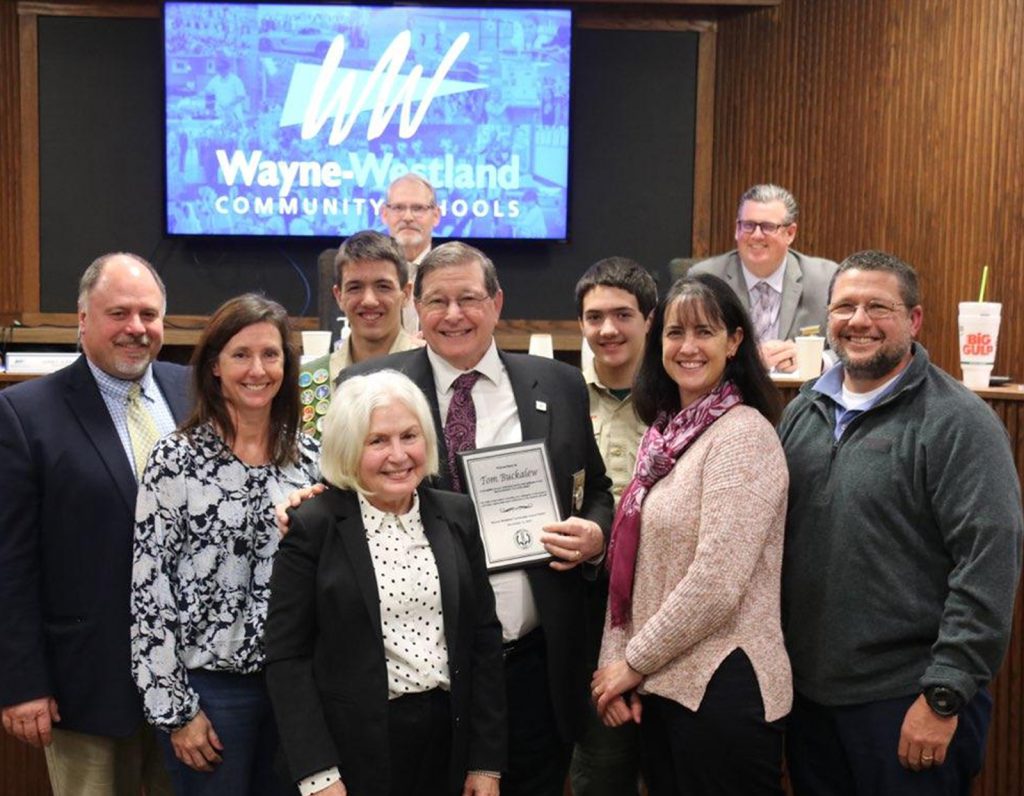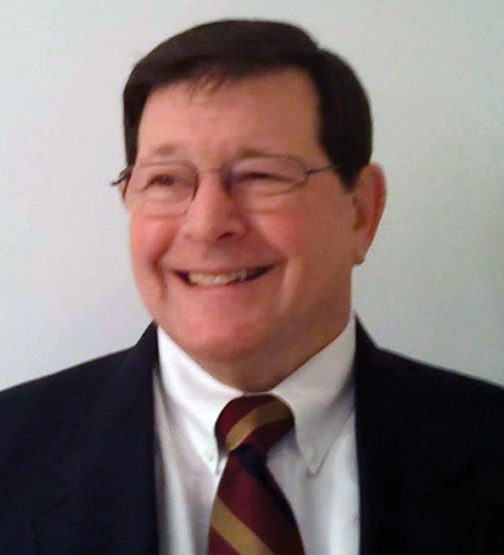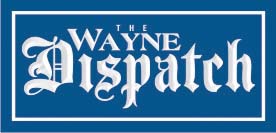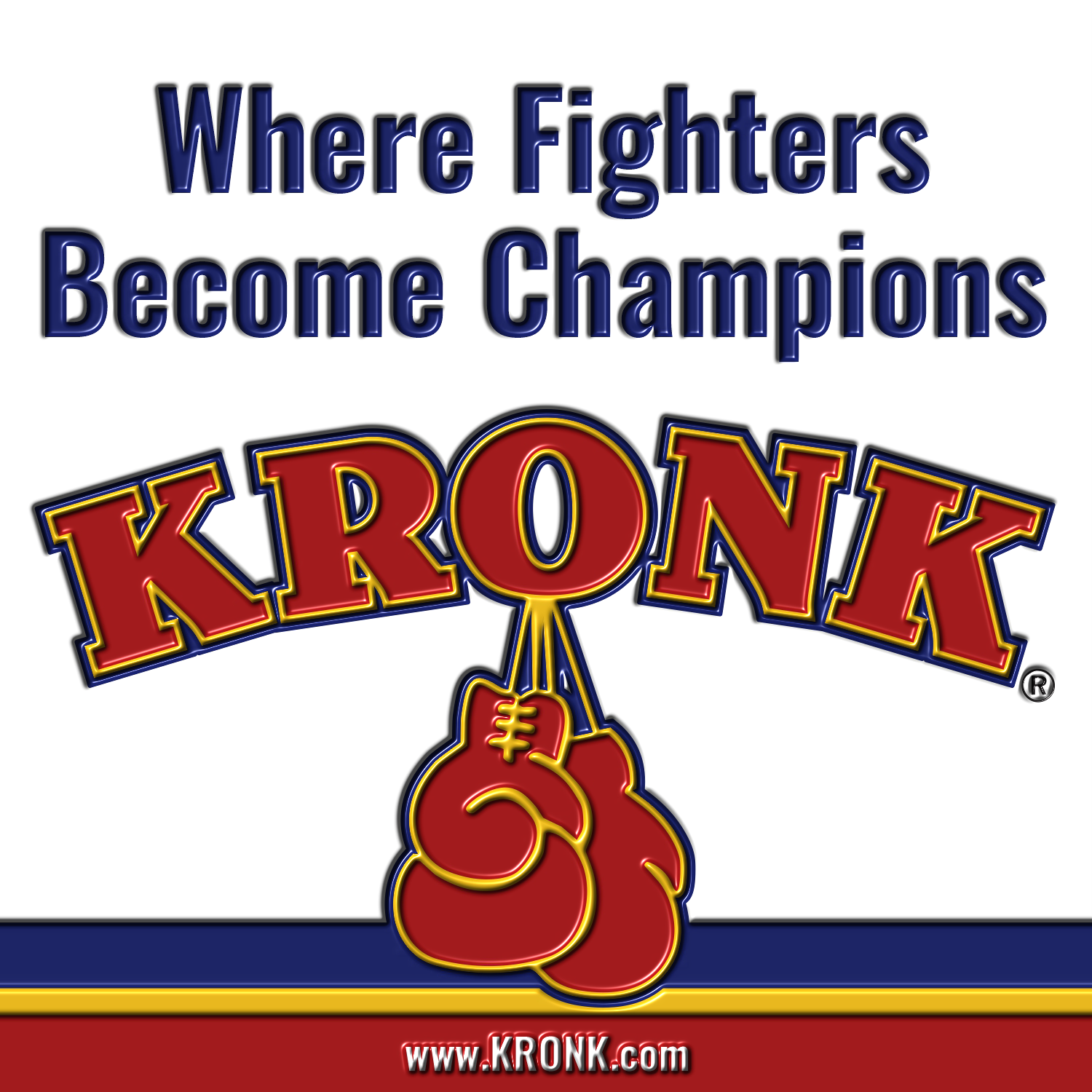Former Wayne-Westland Community School District teacher and school board member Tom Buckalew talks classroom etiquette, life lessons, and vacation plans

Tom Buckalew with his wife Claudia and his family at his last school board meeting.
By Courtney Conover – Having retired from teaching in 2009, Tom Buckalew has become well accustomed to having free time on his hands.
But that’s not to say he’s idle—far from it.
On tap for Buckalew, 78, is a summer brimming with the kind of activity that fuels the soul.
“We’ll be doing some landscaping work on our yard—something that’s long overdue,” begins Buckalew, “I golf with a group of former teachers—we’ve kind of formed an informal golf league—and we try to get out twice a week, so that’s going to be an important part of my summer, and then my wife and I hope to take a couple of mini vacations around the state—the UP, see the Pictured Rocks, or go over on the west side to Grand Rapids and see the Meijer Gardens…there are so many wonderful places.”
In short, this is what retirement should look like. And it’s well-deserved.
This chapter of Buckalew’s life story comes after decades of service within the field of education and, most notably, Wayne-Westland Community Schools. Upon graduating high school from Flint Central High School in Flint, Michigan, in 1963, Buckalew entered Eastern Michigan University where he earned a Bachelor of Science and master’s degree before obtaining an education specialist certificate from Wayne State University. After completing a student teaching assignment at South Junior High in Allen Park, Buckalew, a self-professed “GM boy from Flint,” spent his entire teaching career—which consisted of an impressive 41 years—at John Glenn High School.
“It was a fantastic place,” he remembers of his nearly four-decade tenure in Rocket country.
Buckalew recently led The Wayne Dispatch on a trip down Memory Lane while also providing a glimpse of what his future has in store.
Courtney Conover: Your plans for this summer sound lovely. But I’m guessing this summer looks a lot different than the summers when you were teaching…
Tom Buckalew: Well, for so many years, I always looked forward to summer because it is a change of pace, and you’re out of the classroom. But I always worked in the summer. I had a job one summer putting new drive lines in car washes. We would dig ‘em out and pour the concrete for the new drive line; for a couple of years, I worked in a small steel factory; but mostly, I taught driver’s education. I had a summer job into the mid-90s. So, I didn’t start taking the summers off until [approximately] 1992.
CC: Let’s rewind and go all the way back to the beginning. Tell me about the start of your adventure in teaching.
TB: In 1967 and 1968, I had an opportunity to do two things: I was a student teacher in Allen Park—at South Junior High—and at the same time, I coached wrestling at Ypsilanti Lincoln. So that was kind of my first introduction to the profession.
CC: What prompted you to become a teacher in the first place?
TB: I always wanted to be one, really. When I was in the 4th or 5th grade, my teachers always kept a couple history books that they would let students borrow—there was a Davy Crockett book, an Abraham Lincoln book…I got to take those home. And they instilled in me the idea that I really liked history, or at least the biography part. Other disciplines, not so much. So, I followed through with it and took all the history I could in high school. And then, in college, I always chose history when I had an elective opportunity.
CC: But the sport of wrestling played a part, too, right?
TB: In high school, I was blessed to have a wonderful gentleman as my wrestling coach. And I was so impressed by what he did and how he moved and acted that I really wanted to be a teacher. And a coach.
CC: How long have you lived in the City of Wayne?
TB: I lived in Westland for 20 years, and this is our 35th year in Wayne.
CC: John Glenn is where you officially started—and where you retired. But did you always teach solely history/social studies?
TB: I was hired to teach English, but I got out of that very quickly—before they discovered how bad I was. So, primarily, I taught 11th grade history until they moved the program to the 10th grade. And, on and off, I taught an English class here and there along the way—and I taught some other social studies courses.
CC: What was the absolute best thing about being a teacher?
TB: You know, there are always those kids who give you trouble, but by and large, it was the kids [that were the best part]. They keep you young. I really enjoyed working with the kids. There are always bad days—you know that. But there were so many more good days.
CC: What was the absolute worst?

Tom Buckalew
TB: I could point to a problem I had with an administrator, or a problem I had with a member of the staff—a couple, in fact. But those were incidents. I’m not sure I could point to a bad thing. A friend of mine once said, “I come to school every day with a plan, and I try to achieve what’s on that plan.” And I thought, What a wonderful way to summarize what to do. And I’ve kind of stolen that line from him. Now, I didn’t always get everything done. But that is what I tried to do. The day of a teacher is filled with teachable moments.
CC: What is your biggest pet-peeve regarding poor classroom etiquette?
TB: While I was on the school board, I went back [to Glenn] to visit, and I saw some kids standing in the hall with a teacher…and they were on their cellphones. I was internally going ballistic—until the teacher pulled out his cellphone! And it was permissible. It was something I wasn’t prepared to see. It wasn’t like they were doing anything wrong—it was between classes, and they were permitted to do it. But in my day, which wasn’t too many days or years earlier than that, oh, no, you couldn’t have a cellphone. So, as times change, you either have issues—or you have to change with the times.
CC: There’s a saying that it takes a village to raise a child, and I imagine it takes a similar collective approach when it comes to ensuring that a school runs smoothly. How important is it that school staff get on well together?
TB: If you’re in an elementary building, you’ve got a relatively small group of teachers, so everyone has to be involved in everything. As you move up to middle school, maybe more teachers can get involved in this or that. When you get to the high school level, it’s almost like every teacher needs to do something. Unfortunately, not every teacher does something. But they need to do something. One teacher might be working with Honor Society, another teacher might be involved in coaching, etc. Everyone just kind of finds a way to fit in. And it isn’t just the teachers. Our custodians at John Glenn were tremendous people and certainly contributed to helping the kids. So, back to your question, what makes a school run? It’s everybody.
CC: Tell me about your family, which I know includes your beautiful wife, Claudia. How many years have you been married? And what have you found to be the key to a relationship’s longevity?
TB: It’ll be 56 years in August. As for longevity, a great deal of tolerance. My wife made tremendous sacrifices when I was coaching, and I appreciate that a great deal. She was the principal parent in the house for much of that time and covered for me. I think we really care for and love each other a great deal, that certainly is important. And we give each other some space. I have my golf, and she has her activities with her family and now, recently, with the Historical Commission and Garden Club here in town. So, we’re free to go our own way from time to time. We have our space, and we have our together time.
CC: And how many children do you share together?
TC: We have two. Our daughter lives in Manchester; she has two adult children, both in college. My son lives in Westland, just about a half a mile from us. And he has two sons.
CC: I can’t end this interview without infusing at least a little bit of wrestling…
TB: I wrestled in high school, and I wrestled in college. And I worked as an assistant for the man who started the [wrestling] program at John Glenn, Bob Lusk, who passed away last year and was a wonderful human being. I knew a lot about wrestling, but I didn’t know a lot about coaching. I learned a lot from him. And after he retired from coaching, I took over as the head coach. I was the head coach for eight years and had about 20 years in the program. After I got out of coaching [at Glenn], I spent a couple of years coaching as an assistant over at Adams Middle School.
CC: Technological advancements aside, I think, in some ways, educating our youth has become more challenging than ever. What, in your opinion, is something you’d like to see more of in the realm of education?
TB: I’ve gone to so many parent-teacher conferences as a teacher and sat around looking at the wall. More parent involvement would be a tremendous boon to their students’ education. If it’s true that making a school successful includes everybody working in the building, it includes the parents, too.




